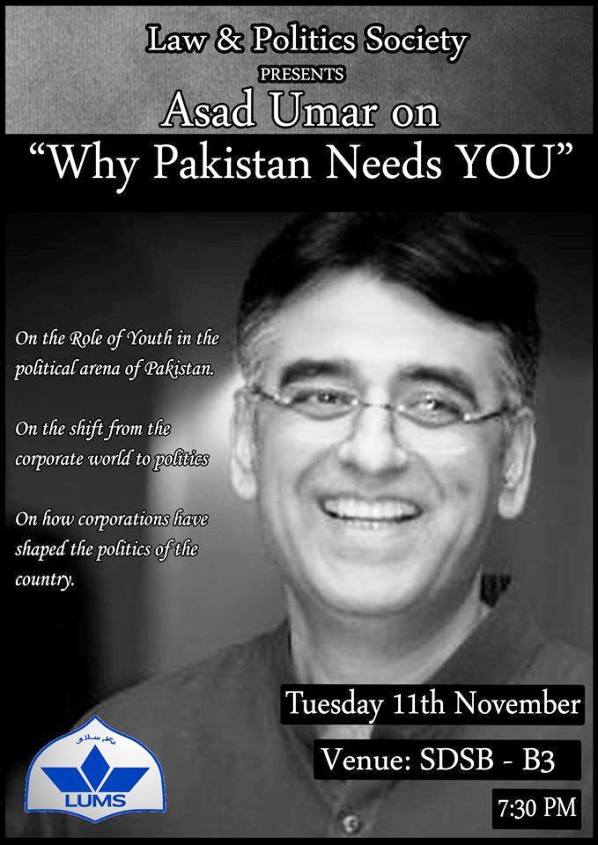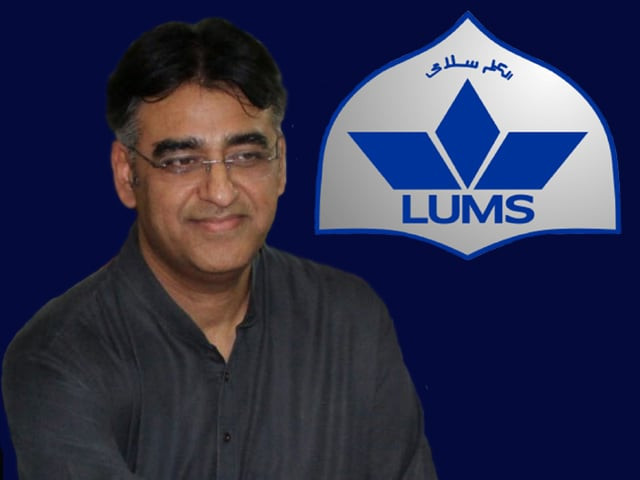LUMS has since issued a public apology to Umar acknowledging that permission was granted to the Law and Politics Society at LUMS to invite him to speak to the students. The permission had been sought from the university and the topics of discussion were approved. However, just a couple of days before the event, LUMS revoked the permission and cancelled the talk.
As a former student of the university, I stood holding a placard as hundreds of us actively protested against Pervez Musharaf’s imposition of emergency in the country. We stood steadfast as police tried to break into the university possessing FIRs against students and professors of the university. The Vice Chancellor, Syed Zahoor Hassan, stood with us and placated the situation narrowly avoiding a direct confrontation.
I sat on the road in H-Block when a student of LUMS passed away after a Prado driven rashly by an intoxicated son of a rich businessman. We organised a protest outside the Vice Chancellor, Ahmad Jan Durrani’s office, and he ceded to our demands.
I stood in line as hundreds of students poured into a tightly packed auditorium to attend talks by Imran Khan. I sat in the sports complex as Asim Sajjad Akhtar, former professor at LUMS and the President of the Awami Workers Party (AWP) Punjab sang, “Na Tera Pakistan Hai, Na Mera Pakistan Hai, Ye Uska Pakistan hai jo Sadr-e-Pakistan Hai” in a rousing speech against Musharraf, who at that time was ironically the sitting president, technically the chancellor of LUMS.
The very mandate of the Law and Politics Society states that it was created to create a greater awareness about national political issues and to encourage their participation in the political process. It further states,
“The society hopes to generate an atmosphere of political consciousness which promulgates a deep sense of civic responsibility.”
In light of my personal experiences, news breaking out on social media that the event was cancelled due to Umar’s political affiliations made little sense to me. As a member of the LUMS Student Council, I conveyed the first Student Societies Forum and there has never been any official policy of the university to bar societies from inviting people with political affiliations. Based on this, will Abrarul Haq not be allowed to perform at any of the concerts at LUMS?
However, the official statement from LUMS differs from the news stating that it cancelled the event on a technical ground; the poster used to advertise the event strayed away from the guidelines for promotional material for events. LUMS felt that the posters made the event political rather than educational. It goes on to categorically state that Umar is welcome to speak at the university in the future at an event organised within the university’s guidelines.

Having personally seen the ‘contentious’ poster, I feel there is nothing political about it. There are no political symbols, or mentions of Umar’s political affiliations. The only bone of contention the university had with the issue was the use of the headline, “Why Pakistan Needs You”, which LUMS felt made the event political despite the society getting the topics that Umar was meant to speak on approved by the university.
According to sources from Umar’s camp, the head of the Law Department at LUMS had personally intervened to ensure that the speaker would not make any political statements.
Political parties in the past have exploited Student Unions resulting in a degradation of the university environments all over Pakistan. Karachi has especially suffered with many student unions being militarised. In light of our history with politics in universities, it is a prudent policy by LUMS to remain apolitical. But despite citing the need to remain apolitical, its decision to cancel Umar’s event, despite earlier approving it, reeks of right wing politics.
Questions were raised at the appointment of Sohail Naqvi, and the sudden departure of Adil Najam from his role as the vice chancellor of LUMS, after serving a mere two years of his tenure, in May 2013. His appointment has proved to be an unpopular one amongst the students. Although there is no evidence of political influence exerted in this particular scenario, the students have gone on a rampage on social media. The hashtag #ShameOnLUMSVC has been trending on Twitter.
I believe it is a great disservice to the university that this case has been politicised to such an extent. If the university felt like the society overlooked a technicality in the poster guidelines, they could have fined the society. Mr Mazhar Chinoy of the office of Student Affairs has repeatedly fined societies for violating promotional material guidelines in the past. In fact, in one instance in the past, when financial discrepancies were discovered at an event, the students were punished but the event was not cancelled; which makes the cancellation of this event even odder.
At the end of the day, the largest stakeholders of LUMS are its current students. How the affairs of the university are conducted should be an active result of the negotiations between the students and the university at large. Vice chancellors in the past have kept an open door policy, and been quick to address issues internally with conversations with the students rather than releasing media statements. The new vice chancellor still seems to be bedding in his new role, having to combat with a different challenges after serving eight years in the Higher Education Commission.
LUMS’s role in ensuring no political activity takes place on campus is admirable but every university has an active role in teaching its students about their civic duty and raising their political consciousness. The political science department prides itself in teaching political theories from around the world and encouraging an active discourse on them. In such an environment, restricting the flow of ideas seems archaic and dictatorial.
Even though there is a difference between apolitical and non-political, it is impossible to be non-political. Every single decision you take has political ramifications. However, LUMS should be apolitical – it should not express any political affiliations, or encourage any promotion of a specific political party on campus. By cancelling this particular event, it has raised questions about its ability to remain apolitical because even if the decision was based around a technicality, it has become politicised. In the highly politically charged environment that our country finds itself in, LUMS should have been aware of the potential for that to happen and acted more prudently, especially after receiving assurances from Umar, a man who has served on the LUMS Board of Trustees in the past.



COMMENTS
Comments are moderated and generally will be posted if they are on-topic and not abusive.
For more information, please see our Comments FAQ